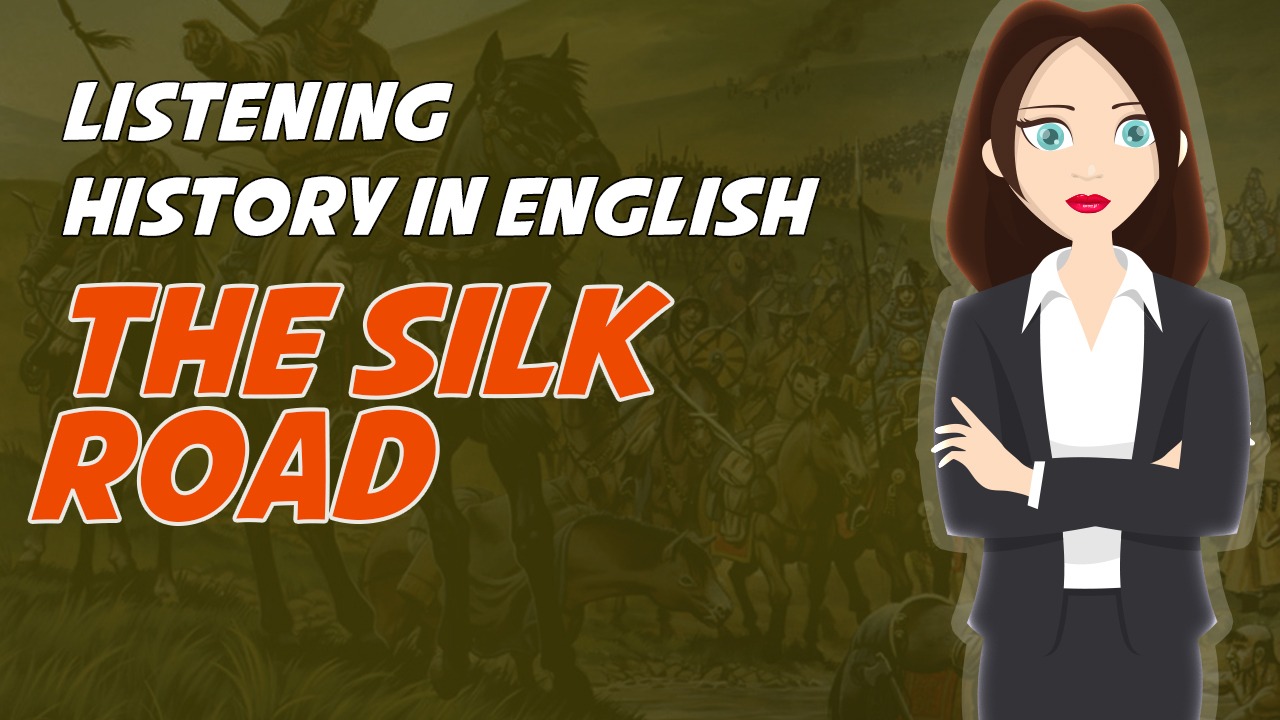Pre-intermediate Short Listening History and Quiz in English and Vocabulary - The Silk Road

Carla:
Hello everyone. Welcome to our history telling show
Tonight I am going to tell the story about The silk road.
But before narrating the story, click the link to test your English listening skills.
Allright, lets get started
The Silk Road is a name given to the many trade routes that connected Europe and the Mediterranean with the Asian world. The route is over 6,500 km long and got its name because the early Chinese traded silk along it. Although silk was the main trading item there were many other goods that travelled along the Silk Road between Eastern Asia and Europe. In the course of time, medicine, perfumes, spices and livestock found their way between continents.
The Chinese learned to make silk thousands of years ago. For a long time they were the only ones who knew how to make this precious material. Only the emperor, his family and his highest advisers were allowed to wear clothes made of silk. For a long time the Chinese guarded this secret very carefully.
The ancient Romans were the first Europeans who became aware of this wonderful material. Trading started, often with Indians as middlemen who traded silk with the Chinese in exchange for gold and silver which they got from the Romans.
Travelling along the route was dangerous. The hot desert, high mountains and sandstorms made travelling a rough business. Most of the goods along the Silk Road were carried by caravans. Traders sometimes brought goods from one destination on the Silk Road to another, from where the goods would be transported by someone else. Over the centuries people settled along the ancient route and many cities emerged. Later on there were fewer hardships to overcome, but by no means was it easy.
Religion, languages and diseases also spread along the Silk Road. Buddhism, which originated in India, spread to China along this route. European traders probably brought the plague from Asia to Europe along the ancient road.
In the early Middle Ages traffic along the route decreased because of the decline of the Roman Empire. Trading along the Silk Road and became stronger again between the 13th and 14th centuries, when the Mongols controlled central Asia. During the Age of Exploration the Silk Road lost its importance because new sea routes to Asia were discovered.
The source of listening material >> english-online.at
English Vocabulary - Azərbaycan dili Lüğət - Türkçə sözlük - Pусский словарь
| trade routes | ticarət yolları | Ticaret yolları | торговые пути |
| to connect | birləşdirmək, əlaqələndirmək, bitişmək | bağlanmak, bağlamak, birleştirmek | соединять, связывать, сочетать |
| Mediterranean | Aralıq dənizi | Akdeniz | Средиземноморье |
| to trade | ticarət etmək, alver etmək | ticaret yapmak, iş yapmak | торговать |
| silk | ipək | ipek | шелк |
| goods | mallar, əmtiə | eşya, mal | товар |
| In the course of time | Vaxt keçdikcə | Zaman içinde | С течением времени |
| medicine | dərman | ilaç | лекарство |
| perfumes | ətirlər | parfümler | духи |
| spices | ədviyyat | baharat | специи |
| livestock | mal-qara | çiftlik hayvanları | скот |
| precious | qiymətli | değerli kıymetli | драгоценный |
| emperor | imperator | imparator | император |
| adviser | məsləhətçi, ağsaqqal | danışman, akıl hocası | советник |
| to guard | qorumaq, mühafizə etmək | korumak | охранять оберегать |
| to become aware of | xəbərdar olmaq | Farkına varmak | чтобы узнать о |
| in exchange for | qarşılığında | Karşılık olarak | в обмен на |
| silver | gümüş | gümüş | серебро |
| desert | səhra | çöl, bozkır, ıssız yer | пустыня |
| sandstorm | qum fırtınası | kum fırtınası | песчаная буря |
| destination | təyinat yeri | varış yeri, istikamet, gidilecek yer | пункт назначения |
| to transport | daşımaq | taşımak, nakletmek | транспортировать |
| to settle | yerləşmək | yerleşmek | поселиться |
| to emerge | ortaya çıxmaq | ortaya çıkmak | появиться |
| hardship | çətinlik | zorluk, sıkıntı | трудности |
| to overcome | qət etmək | üstesinden gelmek, atlatmak, başa çıkmak | преодолеть |
| by no means | heç cür | hiçbir şekilde | ни в коем случае |
| religion | din | din | религия |
| disease | xəstəlik | hastalık | болезнь |
| to spread | yayılmaq, yaymak | yaymak, yayılmak | распространять |
| to originate | yaratmaq, yaranmaq | kaynaklanmak, meydana gelmek | возникать, происходить |
| plague | vəba, taun | veba | чума |
| Middle Ages | Orta əsrlər | Orta Çağlar | средние века |
| to decrease | azaltmaq, azalmaq | azaltmak, azalmak, eksilmek | уменьшать |
| decline | eniş, tənəzzül | düşüş, çöküş | упасть, снижение |
| importance | əhəmiyyət | önem, itibar | важность, значительность |
| Exploration | tədqiqat, araşdırma | Keşif, arama, araştırma | Исследование |


